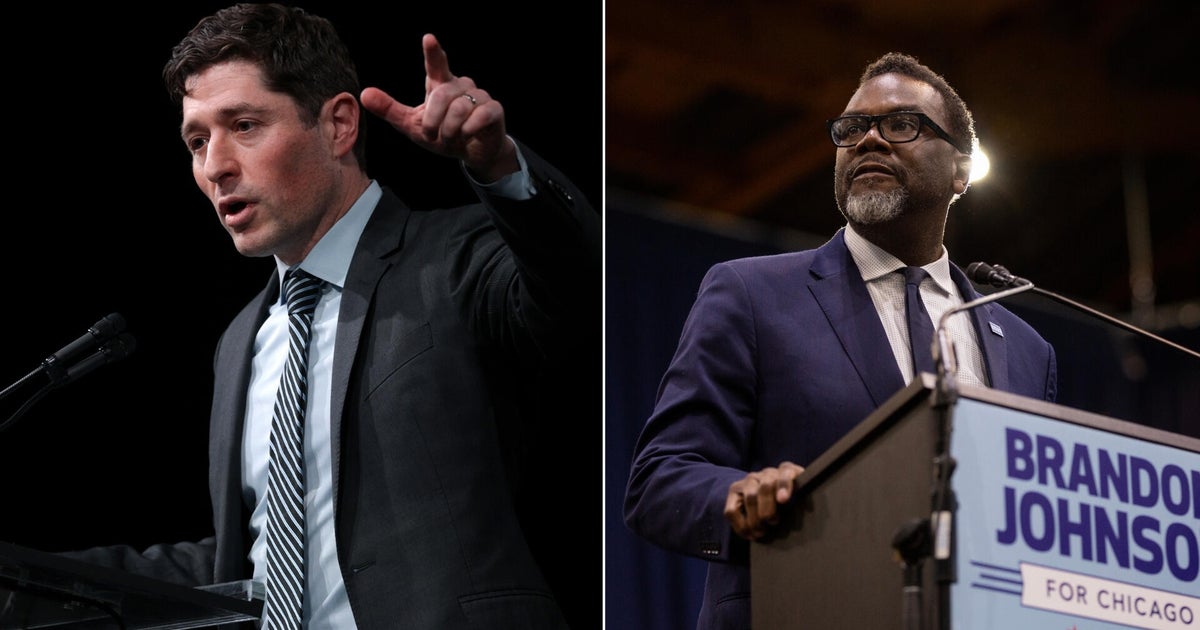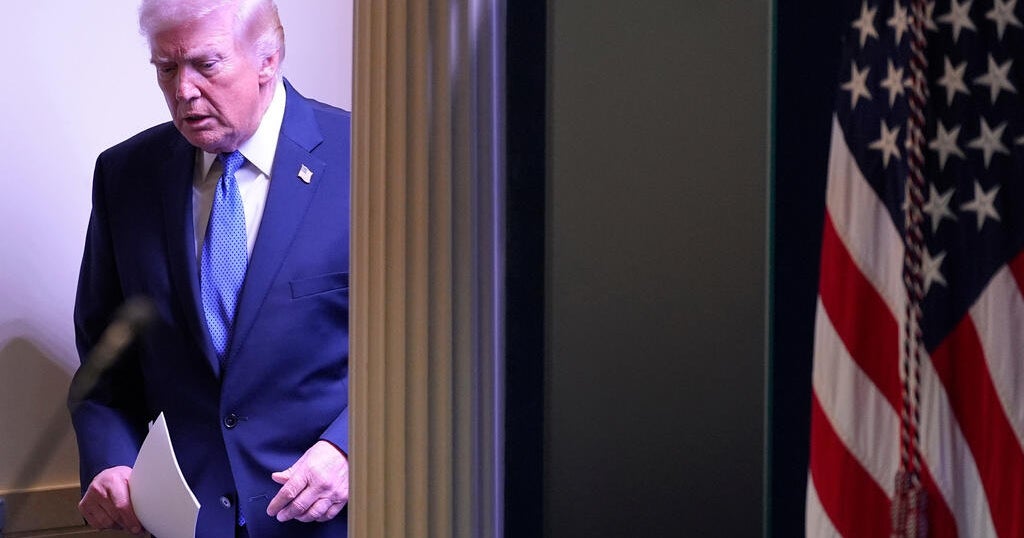Attorney General William Barr intends to release Mueller report "within a week"
Attorney General William Barr hopes to release special counsel Robert Mueller's report, with redactions, "within a week," he told members of a House Appropriations subcommittee Tuesday.
Barr had said he expects to release the full report by mid-April, after releasing a four-page summary of Mueller's report that Democrats deemed unsatisfactory. The attorney general, however, is reluctant to get into details of the report, and he's on Capitol Hill ostensibly to testify about the Justice Department's budget.
Here's what the public has learned so far in the hearing:
- Barr says he met with Mueller on March 5, so the "thinking" of the special counsel wasn't a mystery to him when he received the report to summarize it;
- The report will include redactions that are color-coded, to indicate the reason the information was redacted;
- Barr declined to say whether he has briefed the White House on the report or allowed the White House to see any of the report;
- Barr isn't committing to releasing an unredacted version of the report to Congress;
- Barr says Mueller declined to review Barr's summary of the report before releasing the summary to the public.
Read updates in real time below.
--Emily Tillett, Rebecca Kaplan, Kathryn Watson and Grace Segers contributed to this report
Rep. Nita Lowey told reporters after the hearing that she believed Barr was a political appointee who was loyal to President Trump's interests. She questioned Barr's sharing of his March 24 letter on the Mueller report to the White House before it was released, and said that she would not accept a redacted version of the Mueller report.
"As a member of Congress, as the chair of the Appropriations Committee, I look forward to seeing the complete report without redactions," Lowey said, adding that House Judiciary Committee Chairman Jerry Nadler would subpoena the full report.
"The attorney general just stonewalled us," Lowey said about Barr's testimony.
Hearing adjourns after nearly three hours
In his closing remarks, subcommittee chairman José Serrano thanked Barr for his testimony and urged him not to "choose sides" at the expense of the American people.
"We lean on you to come through for the country," Serrano said, tacitly encouraging Barr not to side with President Trump if he disagrees with the president.
Crist asks Barr about DOJ refusal to support Affordable Care Act in court
Rep. Charlie Crist, Democrat from Florida, questioned Barr about the Justice Department's refusal to defend the Affordable Care Act in pending legislation which would invalidate the law. Crist said that many people would lose health care coverage if the law was overturned and there was no replacement in place.
"If this is such a hokey position to have, what are you worried about?" Barr asked Crist about the administration's position on the ACA, adding that strengthening health care was a policy matter. "I'm a lawyer. I'm not in charge of health care."
"What I'm worried about are the people I work for. The American people. And the people you work for, sir," Crist shot back.
Barr address reports that some special counsel investigators were unhappy with his summary
Rep. Sam Graves, Republican from Missouri, questioned Barr about reports that some members of Mueller's team were dissatisfied with Barr's March 24 letter summarizing the main points of the special counsel's report.
"They weren't my findings, I was just trying to state principal conclusions," Barr said about the letter.
"In essence, they're just upset with their own findings," Graves said, referring to the allegedly disgruntled members of Mueller's team.
"I don't know whether they're upset," Barr said, noting that no member of Mueller's team was directly quoted in these reports.
Lowey grills Barr on background checks for gun purchases
Pivoting to the contentious topic of gun control, Appropriations Committee Chairwoman Nita Lowey asked about the current system of background checks, under which the FBI has up to three days to do a background checks on a prospective gun owner. However, if the FBI does not do the background check within three days, the gun can still be sold.
The shooters in the Charleston, South Carolina, Emanuel AME church mass shooting in 2015, and the Aurora, Illinois, warehouse attack earlier this year were able to possess firearms despite background information that should have made them ineligible to carry guns.
Barr said that he did not support extending the time the FBI has to conduct a background check to more than three days.
"I think that puts a burden on a lot of people," Barr said. "I think the far bigger problem is the problem of mental health."
Barr says Mueller declined to review summary of report
Barr testified that his office had asked Mueller if he wanted to review his summary of Mueller's report before releasing the summary to the public, but Mueller declined to do so.
In his testimony, Barr often refers to Mueller on a first-name basis as "Bob." The two have known each other for years.
Barr says he "isn't familiar" with any renewed push to separate families at border
Barr, pressed about reports that the president wants to reinstate the separation of families at the border, said, "I, personally sitting here, am not familiar with those discussions."
Asked if he would support the separation of families, Barr pointed to Mr. Trump's executive order -- issued under intense public pressure -- to stop the practice.
"I support the president's policy, which is we're not going to separate families," Barr said.
Barr says he didn't coordinate Mueller report summary with White House
Barr told the subcommittee he didn't consult with the White House on the March 24 letter summarizing Mueller's report.
Barr says he met with Mueller about report in early March
Pressed by Rep. Nita Lowey on how he was able to quickly summarize Mueller's report, Barr explained he did have a heads up.
Barr told Lowey the "thinking" of the special counsel "was not a mystery" to the leadership at the Justice Department. The attorney general said he met with Mueller on March 5th, so "we had an inkling of what was coming." Barr said he, Deputy Attorney General Rod Rosenstein and their staffs worked closely together to prepare the memo.
Barr won't commit to giving Congress unredacted Mueller report
Barr, answering questions from Lowey, declined to commit to give Congress an unredacted version of the report.
Later in his testimony, Barr reiterated that sentiment.
"I don't expect to send the full unredacted report to the committee," the attorney general said.
Barr refuses to say whether White House has seen any of the Mueller report
When Lowey asked Barr if the White House has seen or been briefed on Mueller's report, Barr declined to say.
"I'm not going to say anything more about it," he told members present.
The Mueller report will be color-coded
Barr said that when he releases the Mueller report, he will provide "explanatory notes" describing the basis for each redaction, and those redactions will be color-coded, Barr said.
The attorney general said the redaction process is "going along very well."
Barr says he hopes to release Mueller report within a week
Attorney General William Barr told the committee he hopes to release the Mueller report, with redactions, within a week. He did not give a day.
Barr had previously said he would likely release the report by mid-April.
Barr asks for funding for more immigration judges, after Trump said U.S. should "get rid of judges"
Last week, Mr. Trump, as he fumed over the U.S. immigration system, said the U.S. needs to "get rid of judges."
But in his testimony, Barr touted how many immigration court judges the administration has hired, and requested funding to increase their ranks.
The U.S. is facing record-high immigration court backlogs.
Barr speaks out for first time in hearing
Barr began speaking at 9:45 a.m., after listening to Democrats' criticisms of his handling of the Mueller report.
But Barr himself isn't expected to bring up the Mueller report, at least, so long as he sticks with his prepared remarks.
The attorney general described the Trump administration's request to increase funding to fight violent crimes, and the opioid epidemic.
Barr called the opioid epidemic "by far" the most dangerous drug crisis the country has ever faced.
Hearing begins as Democrats question Barr's objectivity
The hearing began moments after 9:30 a.m., with the Democratic subcommittee chairman Rep. Jose Serrano saying there's an "elephant in the room," not referring to colleagues on the other side of the aisle.
Serrano said Congress and the American people deserve to see the full Mueller report, and "serious concerns about the process by which you formulated your letter."
"I think it would strike a serious blow to our system and yes to our democracy if that report is not fully seen," he said.
Rep. Nita Lowey, also a Democrat, blasted Barr for what she called an unacceptable handling of the Mueller report.
Nadler says "content" of Mueller report matters, not timing
House Judiciary Chairman Jerry Nadler, D-New York, told reporters on Capitol Hill that the timing of the release of Robert Mueller's report "doesn't matter" as much as the contents of the report.
He said the question still remains on just what members of Congress will or won't receive when the report is released, and said lawmakers would have to make a determination as to whether they call committees into session or issue subpoenas in order to get a complete, un-redacted version of the report.
Barr arrives on Capitol Hill
Shortly after 9:00 a.m., the attorney general arrived on the Hill. Barr will remain in a hold room until approximately 9:30 at which point he will enter into the hearing chamber.
How today's hearing will play out
With just 11 members on the committee, following opening statements there will be a maximum of 2 rounds of questions. Members are allotted 5 minutes to press Barr on the DOJ's budget or attempt to get the attorney general on the record on the Mueller report.
The hearing is expected to wrap early afternoon.
--Reporting by Rebecca Kaplan
Nita Lowey to tell Barr the way he handled Mueller report "unacceptable"
New York Democrat Nita Lowey, the chairwoman of the House Appropriations Committee, will tell Barr the way he handled the Mueller report was "unacceptable" and that his four-page letter about the report "raises more questions than it answers," according to excerpts of her remarks as prepared for delivery.
"I must say, it is extraordinary to evaluate hundreds of pages of evidence, legal documents, and findings based on a 22-month long inquiry and make definitive legal conclusions in less than 48 hours," Lowey will say. "Even for someone who has done this job before, I would argue it is more suspicious than impressive."
Rep. José Serrano, D-N.Y., Commerce, Justice and Science Subcommittee chairman, will refer to recent reports of disagreements within the special counsel's office over whether Barr accurately summarized its findings on the question of whether President Trump obstructed justice.
"The American people have been left with many unanswered questions; serious concerns about the process by which you formulated your letter; and uncertainty about when we can expect to see the full report," he will say.
Barr's prepared testimony doesn't mention Mueller
Nowhere in Barr's prepared remarks is Mueller mentioned.
But he does address immigration and election security.
On immigration, Barr is to say, "We must ensure that our laws allow us to process, hold, and remove those who violate our immigration laws."
On election security ahead of the 2020 presidential race, Barr said, the department "is pursuing several programs--both old and new--to protect national security. These include protecting American elections from foreign interference, combating and preventing cyber attacks, and fighting terrorism both at home and abroad."



